Centennial College PNUR125: Nursing Reflection on Clinical Experience
VerifiedAdded on 2022/08/21
|7
|1769
|14
Practical Assignment
AI Summary
This nursing reflection, written by a Practical Nursing student, details a challenging clinical experience involving medication administration in a hospital setting. The student reflects on a situation where a patient initially consented to medication but later refused, leading to feelings of anxiety and inadequacy. The reflection elaborates on the event, including the student's feelings, the involvement of a senior nurse, and the patient's perspective. The analysis section identifies the key issue of gaining patient consent, even when written consent is already obtained, and integrates nursing theory and critical thinking to understand the importance of effective communication. The student revisits the situation, highlighting the importance of effective communication and proactive help-seeking. The reflection concludes with a new perspective on improving nursing practice through robust processes and cognitive assessment of patients to ensure informed consent. The student provides references from nursing textbooks and professional resources to support the analysis and insights.
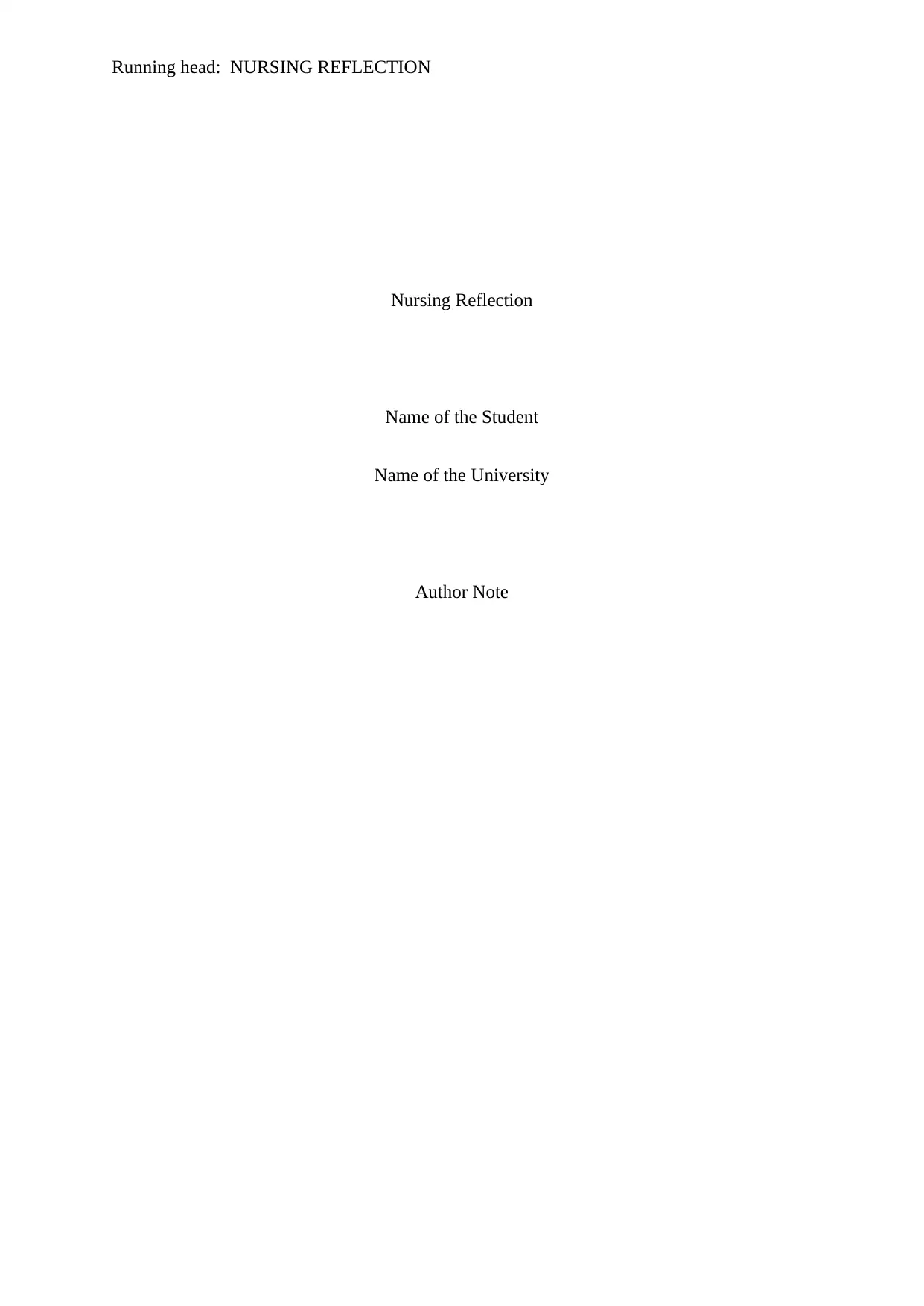
Running head: NURSING REFLECTION
Nursing Reflection
Name of the Student
Name of the University
Author Note
Nursing Reflection
Name of the Student
Name of the University
Author Note
Paraphrase This Document
Need a fresh take? Get an instant paraphrase of this document with our AI Paraphraser
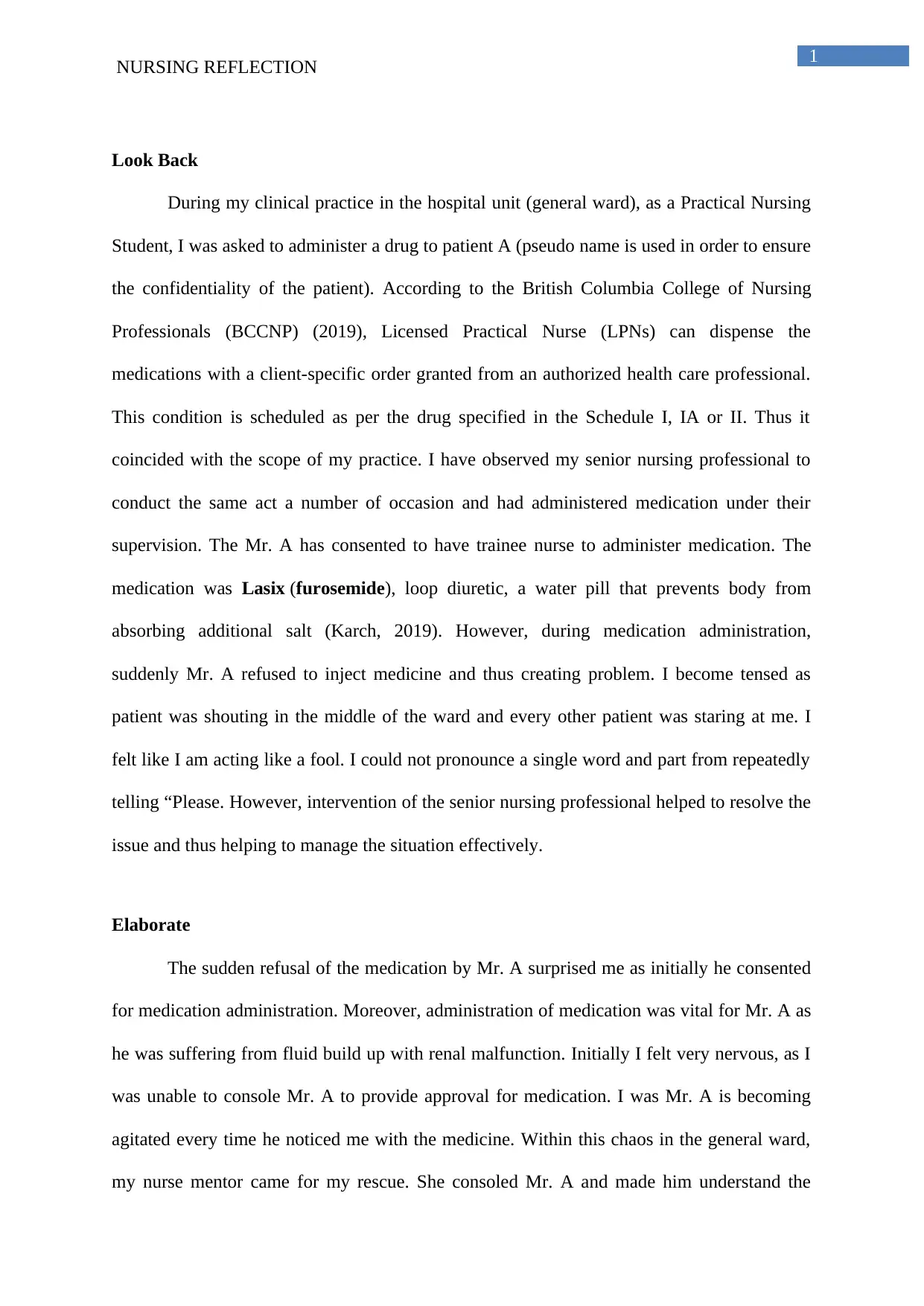
1
NURSING REFLECTION
Look Back
During my clinical practice in the hospital unit (general ward), as a Practical Nursing
Student, I was asked to administer a drug to patient A (pseudo name is used in order to ensure
the confidentiality of the patient). According to the British Columbia College of Nursing
Professionals (BCCNP) (2019), Licensed Practical Nurse (LPNs) can dispense the
medications with a client-specific order granted from an authorized health care professional.
This condition is scheduled as per the drug specified in the Schedule I, IA or II. Thus it
coincided with the scope of my practice. I have observed my senior nursing professional to
conduct the same act a number of occasion and had administered medication under their
supervision. The Mr. A has consented to have trainee nurse to administer medication. The
medication was Lasix (furosemide), loop diuretic, a water pill that prevents body from
absorbing additional salt (Karch, 2019). However, during medication administration,
suddenly Mr. A refused to inject medicine and thus creating problem. I become tensed as
patient was shouting in the middle of the ward and every other patient was staring at me. I
felt like I am acting like a fool. I could not pronounce a single word and part from repeatedly
telling “Please. However, intervention of the senior nursing professional helped to resolve the
issue and thus helping to manage the situation effectively.
Elaborate
The sudden refusal of the medication by Mr. A surprised me as initially he consented
for medication administration. Moreover, administration of medication was vital for Mr. A as
he was suffering from fluid build up with renal malfunction. Initially I felt very nervous, as I
was unable to console Mr. A to provide approval for medication. I was Mr. A is becoming
agitated every time he noticed me with the medicine. Within this chaos in the general ward,
my nurse mentor came for my rescue. She consoled Mr. A and made him understand the
NURSING REFLECTION
Look Back
During my clinical practice in the hospital unit (general ward), as a Practical Nursing
Student, I was asked to administer a drug to patient A (pseudo name is used in order to ensure
the confidentiality of the patient). According to the British Columbia College of Nursing
Professionals (BCCNP) (2019), Licensed Practical Nurse (LPNs) can dispense the
medications with a client-specific order granted from an authorized health care professional.
This condition is scheduled as per the drug specified in the Schedule I, IA or II. Thus it
coincided with the scope of my practice. I have observed my senior nursing professional to
conduct the same act a number of occasion and had administered medication under their
supervision. The Mr. A has consented to have trainee nurse to administer medication. The
medication was Lasix (furosemide), loop diuretic, a water pill that prevents body from
absorbing additional salt (Karch, 2019). However, during medication administration,
suddenly Mr. A refused to inject medicine and thus creating problem. I become tensed as
patient was shouting in the middle of the ward and every other patient was staring at me. I
felt like I am acting like a fool. I could not pronounce a single word and part from repeatedly
telling “Please. However, intervention of the senior nursing professional helped to resolve the
issue and thus helping to manage the situation effectively.
Elaborate
The sudden refusal of the medication by Mr. A surprised me as initially he consented
for medication administration. Moreover, administration of medication was vital for Mr. A as
he was suffering from fluid build up with renal malfunction. Initially I felt very nervous, as I
was unable to console Mr. A to provide approval for medication. I was Mr. A is becoming
agitated every time he noticed me with the medicine. Within this chaos in the general ward,
my nurse mentor came for my rescue. She consoled Mr. A and made him understand the
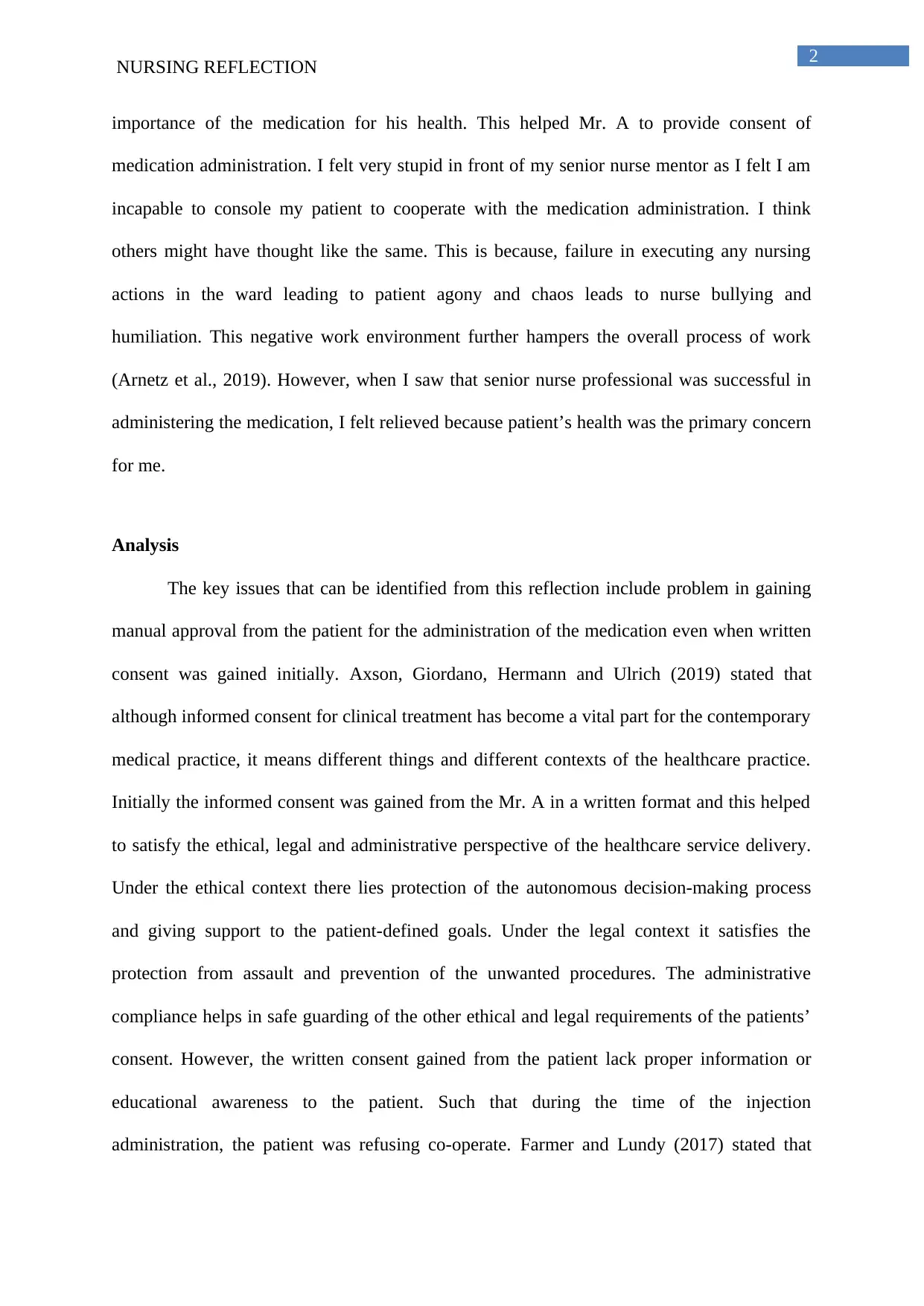
2
NURSING REFLECTION
importance of the medication for his health. This helped Mr. A to provide consent of
medication administration. I felt very stupid in front of my senior nurse mentor as I felt I am
incapable to console my patient to cooperate with the medication administration. I think
others might have thought like the same. This is because, failure in executing any nursing
actions in the ward leading to patient agony and chaos leads to nurse bullying and
humiliation. This negative work environment further hampers the overall process of work
(Arnetz et al., 2019). However, when I saw that senior nurse professional was successful in
administering the medication, I felt relieved because patient’s health was the primary concern
for me.
Analysis
The key issues that can be identified from this reflection include problem in gaining
manual approval from the patient for the administration of the medication even when written
consent was gained initially. Axson, Giordano, Hermann and Ulrich (2019) stated that
although informed consent for clinical treatment has become a vital part for the contemporary
medical practice, it means different things and different contexts of the healthcare practice.
Initially the informed consent was gained from the Mr. A in a written format and this helped
to satisfy the ethical, legal and administrative perspective of the healthcare service delivery.
Under the ethical context there lies protection of the autonomous decision-making process
and giving support to the patient-defined goals. Under the legal context it satisfies the
protection from assault and prevention of the unwanted procedures. The administrative
compliance helps in safe guarding of the other ethical and legal requirements of the patients’
consent. However, the written consent gained from the patient lack proper information or
educational awareness to the patient. Such that during the time of the injection
administration, the patient was refusing co-operate. Farmer and Lundy (2017) stated that
NURSING REFLECTION
importance of the medication for his health. This helped Mr. A to provide consent of
medication administration. I felt very stupid in front of my senior nurse mentor as I felt I am
incapable to console my patient to cooperate with the medication administration. I think
others might have thought like the same. This is because, failure in executing any nursing
actions in the ward leading to patient agony and chaos leads to nurse bullying and
humiliation. This negative work environment further hampers the overall process of work
(Arnetz et al., 2019). However, when I saw that senior nurse professional was successful in
administering the medication, I felt relieved because patient’s health was the primary concern
for me.
Analysis
The key issues that can be identified from this reflection include problem in gaining
manual approval from the patient for the administration of the medication even when written
consent was gained initially. Axson, Giordano, Hermann and Ulrich (2019) stated that
although informed consent for clinical treatment has become a vital part for the contemporary
medical practice, it means different things and different contexts of the healthcare practice.
Initially the informed consent was gained from the Mr. A in a written format and this helped
to satisfy the ethical, legal and administrative perspective of the healthcare service delivery.
Under the ethical context there lies protection of the autonomous decision-making process
and giving support to the patient-defined goals. Under the legal context it satisfies the
protection from assault and prevention of the unwanted procedures. The administrative
compliance helps in safe guarding of the other ethical and legal requirements of the patients’
consent. However, the written consent gained from the patient lack proper information or
educational awareness to the patient. Such that during the time of the injection
administration, the patient was refusing co-operate. Farmer and Lundy (2017) stated that
⊘ This is a preview!⊘
Do you want full access?
Subscribe today to unlock all pages.

Trusted by 1+ million students worldwide
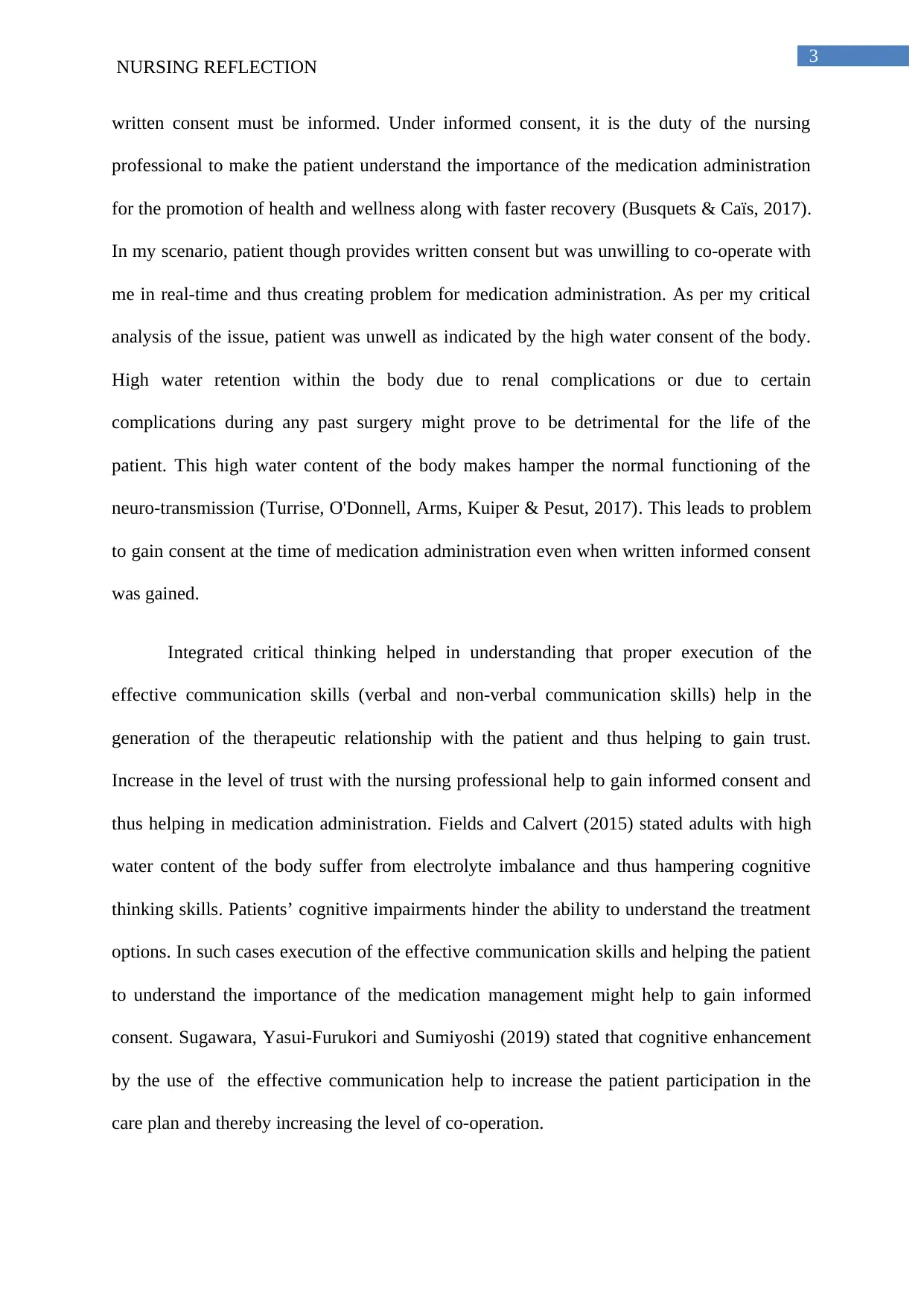
3
NURSING REFLECTION
written consent must be informed. Under informed consent, it is the duty of the nursing
professional to make the patient understand the importance of the medication administration
for the promotion of health and wellness along with faster recovery (Busquets & Caïs, 2017).
In my scenario, patient though provides written consent but was unwilling to co-operate with
me in real-time and thus creating problem for medication administration. As per my critical
analysis of the issue, patient was unwell as indicated by the high water consent of the body.
High water retention within the body due to renal complications or due to certain
complications during any past surgery might prove to be detrimental for the life of the
patient. This high water content of the body makes hamper the normal functioning of the
neuro-transmission (Turrise, O'Donnell, Arms, Kuiper & Pesut, 2017). This leads to problem
to gain consent at the time of medication administration even when written informed consent
was gained.
Integrated critical thinking helped in understanding that proper execution of the
effective communication skills (verbal and non-verbal communication skills) help in the
generation of the therapeutic relationship with the patient and thus helping to gain trust.
Increase in the level of trust with the nursing professional help to gain informed consent and
thus helping in medication administration. Fields and Calvert (2015) stated adults with high
water content of the body suffer from electrolyte imbalance and thus hampering cognitive
thinking skills. Patients’ cognitive impairments hinder the ability to understand the treatment
options. In such cases execution of the effective communication skills and helping the patient
to understand the importance of the medication management might help to gain informed
consent. Sugawara, Yasui-Furukori and Sumiyoshi (2019) stated that cognitive enhancement
by the use of the effective communication help to increase the patient participation in the
care plan and thereby increasing the level of co-operation.
NURSING REFLECTION
written consent must be informed. Under informed consent, it is the duty of the nursing
professional to make the patient understand the importance of the medication administration
for the promotion of health and wellness along with faster recovery (Busquets & Caïs, 2017).
In my scenario, patient though provides written consent but was unwilling to co-operate with
me in real-time and thus creating problem for medication administration. As per my critical
analysis of the issue, patient was unwell as indicated by the high water consent of the body.
High water retention within the body due to renal complications or due to certain
complications during any past surgery might prove to be detrimental for the life of the
patient. This high water content of the body makes hamper the normal functioning of the
neuro-transmission (Turrise, O'Donnell, Arms, Kuiper & Pesut, 2017). This leads to problem
to gain consent at the time of medication administration even when written informed consent
was gained.
Integrated critical thinking helped in understanding that proper execution of the
effective communication skills (verbal and non-verbal communication skills) help in the
generation of the therapeutic relationship with the patient and thus helping to gain trust.
Increase in the level of trust with the nursing professional help to gain informed consent and
thus helping in medication administration. Fields and Calvert (2015) stated adults with high
water content of the body suffer from electrolyte imbalance and thus hampering cognitive
thinking skills. Patients’ cognitive impairments hinder the ability to understand the treatment
options. In such cases execution of the effective communication skills and helping the patient
to understand the importance of the medication management might help to gain informed
consent. Sugawara, Yasui-Furukori and Sumiyoshi (2019) stated that cognitive enhancement
by the use of the effective communication help to increase the patient participation in the
care plan and thereby increasing the level of co-operation.
Paraphrase This Document
Need a fresh take? Get an instant paraphrase of this document with our AI Paraphraser
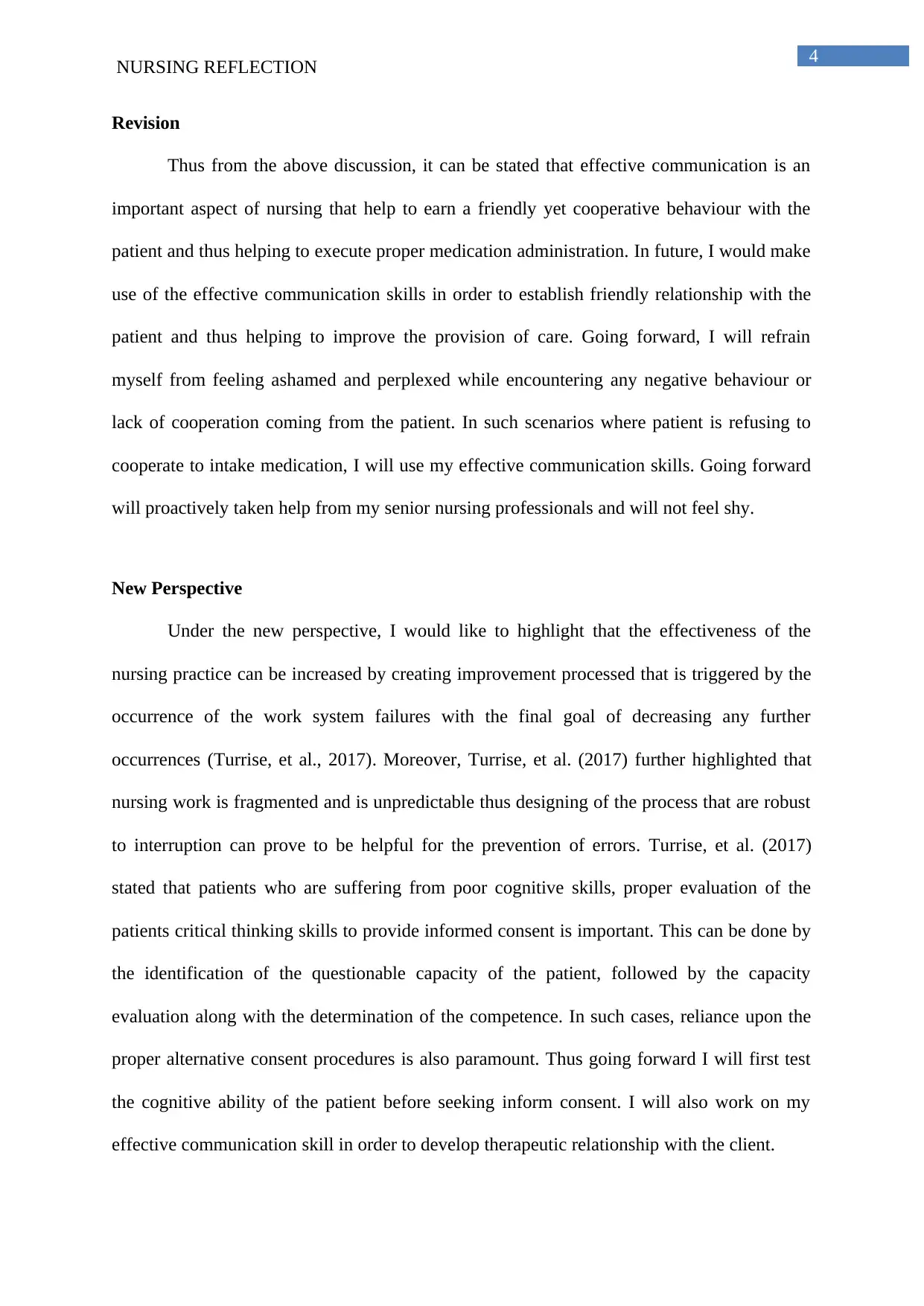
4
NURSING REFLECTION
Revision
Thus from the above discussion, it can be stated that effective communication is an
important aspect of nursing that help to earn a friendly yet cooperative behaviour with the
patient and thus helping to execute proper medication administration. In future, I would make
use of the effective communication skills in order to establish friendly relationship with the
patient and thus helping to improve the provision of care. Going forward, I will refrain
myself from feeling ashamed and perplexed while encountering any negative behaviour or
lack of cooperation coming from the patient. In such scenarios where patient is refusing to
cooperate to intake medication, I will use my effective communication skills. Going forward
will proactively taken help from my senior nursing professionals and will not feel shy.
New Perspective
Under the new perspective, I would like to highlight that the effectiveness of the
nursing practice can be increased by creating improvement processed that is triggered by the
occurrence of the work system failures with the final goal of decreasing any further
occurrences (Turrise, et al., 2017). Moreover, Turrise, et al. (2017) further highlighted that
nursing work is fragmented and is unpredictable thus designing of the process that are robust
to interruption can prove to be helpful for the prevention of errors. Turrise, et al. (2017)
stated that patients who are suffering from poor cognitive skills, proper evaluation of the
patients critical thinking skills to provide informed consent is important. This can be done by
the identification of the questionable capacity of the patient, followed by the capacity
evaluation along with the determination of the competence. In such cases, reliance upon the
proper alternative consent procedures is also paramount. Thus going forward I will first test
the cognitive ability of the patient before seeking inform consent. I will also work on my
effective communication skill in order to develop therapeutic relationship with the client.
NURSING REFLECTION
Revision
Thus from the above discussion, it can be stated that effective communication is an
important aspect of nursing that help to earn a friendly yet cooperative behaviour with the
patient and thus helping to execute proper medication administration. In future, I would make
use of the effective communication skills in order to establish friendly relationship with the
patient and thus helping to improve the provision of care. Going forward, I will refrain
myself from feeling ashamed and perplexed while encountering any negative behaviour or
lack of cooperation coming from the patient. In such scenarios where patient is refusing to
cooperate to intake medication, I will use my effective communication skills. Going forward
will proactively taken help from my senior nursing professionals and will not feel shy.
New Perspective
Under the new perspective, I would like to highlight that the effectiveness of the
nursing practice can be increased by creating improvement processed that is triggered by the
occurrence of the work system failures with the final goal of decreasing any further
occurrences (Turrise, et al., 2017). Moreover, Turrise, et al. (2017) further highlighted that
nursing work is fragmented and is unpredictable thus designing of the process that are robust
to interruption can prove to be helpful for the prevention of errors. Turrise, et al. (2017)
stated that patients who are suffering from poor cognitive skills, proper evaluation of the
patients critical thinking skills to provide informed consent is important. This can be done by
the identification of the questionable capacity of the patient, followed by the capacity
evaluation along with the determination of the competence. In such cases, reliance upon the
proper alternative consent procedures is also paramount. Thus going forward I will first test
the cognitive ability of the patient before seeking inform consent. I will also work on my
effective communication skill in order to develop therapeutic relationship with the client.
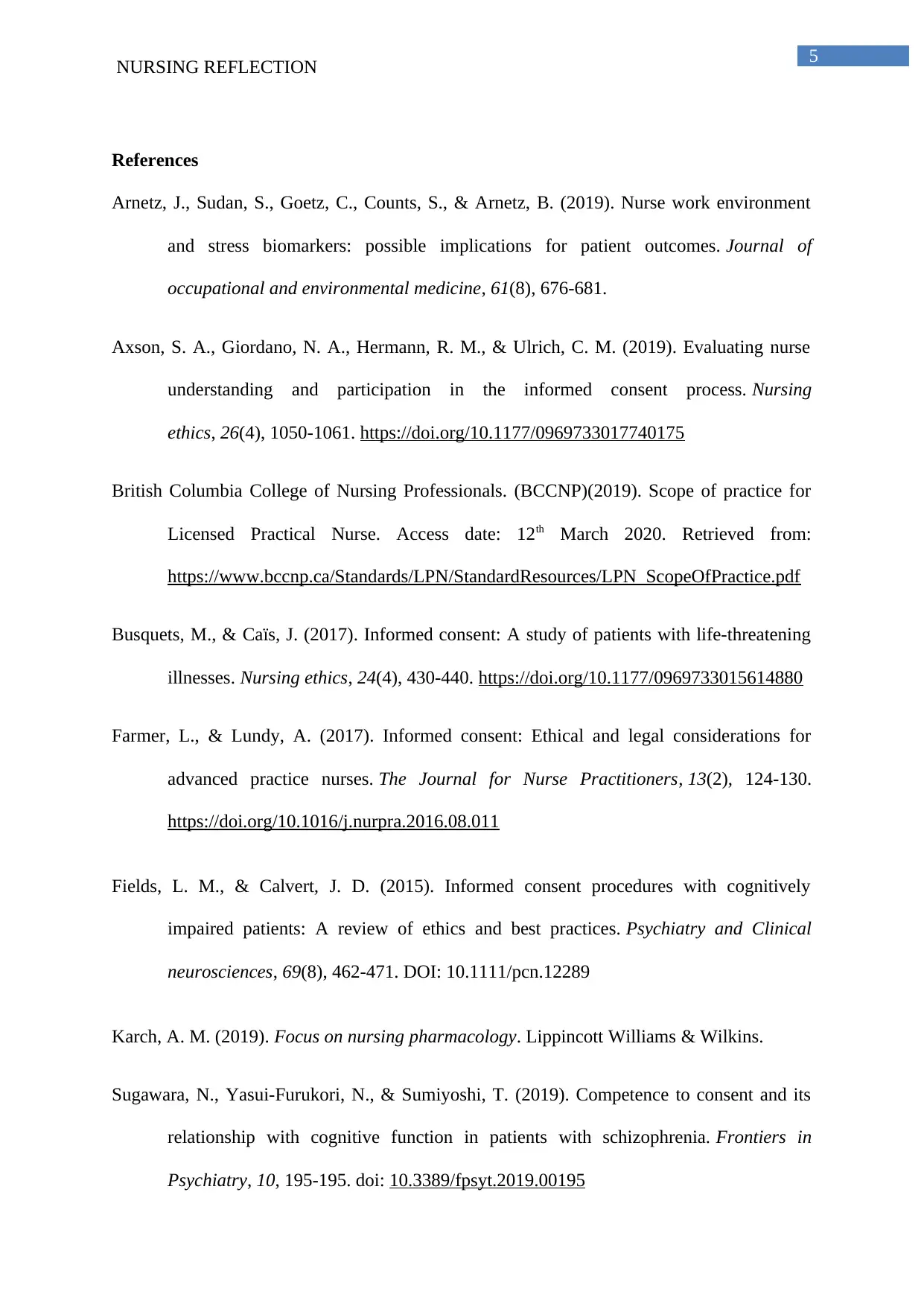
5
NURSING REFLECTION
References
Arnetz, J., Sudan, S., Goetz, C., Counts, S., & Arnetz, B. (2019). Nurse work environment
and stress biomarkers: possible implications for patient outcomes. Journal of
occupational and environmental medicine, 61(8), 676-681.
Axson, S. A., Giordano, N. A., Hermann, R. M., & Ulrich, C. M. (2019). Evaluating nurse
understanding and participation in the informed consent process. Nursing
ethics, 26(4), 1050-1061. https://doi.org/10.1177/0969733017740175
British Columbia College of Nursing Professionals. (BCCNP)(2019). Scope of practice for
Licensed Practical Nurse. Access date: 12th March 2020. Retrieved from:
https://www.bccnp.ca/Standards/LPN/StandardResources/LPN_ScopeOfPractice.pdf
Busquets, M., & Caïs, J. (2017). Informed consent: A study of patients with life-threatening
illnesses. Nursing ethics, 24(4), 430-440. https://doi.org/10.1177/0969733015614880
Farmer, L., & Lundy, A. (2017). Informed consent: Ethical and legal considerations for
advanced practice nurses. The Journal for Nurse Practitioners, 13(2), 124-130.
https://doi.org/10.1016/j.nurpra.2016.08.011
Fields, L. M., & Calvert, J. D. (2015). Informed consent procedures with cognitively
impaired patients: A review of ethics and best practices. Psychiatry and Clinical
neurosciences, 69(8), 462-471. DOI: 10.1111/pcn.12289
Karch, A. M. (2019). Focus on nursing pharmacology. Lippincott Williams & Wilkins.
Sugawara, N., Yasui-Furukori, N., & Sumiyoshi, T. (2019). Competence to consent and its
relationship with cognitive function in patients with schizophrenia. Frontiers in
Psychiatry, 10, 195-195. doi: 10.3389/fpsyt.2019.00195
NURSING REFLECTION
References
Arnetz, J., Sudan, S., Goetz, C., Counts, S., & Arnetz, B. (2019). Nurse work environment
and stress biomarkers: possible implications for patient outcomes. Journal of
occupational and environmental medicine, 61(8), 676-681.
Axson, S. A., Giordano, N. A., Hermann, R. M., & Ulrich, C. M. (2019). Evaluating nurse
understanding and participation in the informed consent process. Nursing
ethics, 26(4), 1050-1061. https://doi.org/10.1177/0969733017740175
British Columbia College of Nursing Professionals. (BCCNP)(2019). Scope of practice for
Licensed Practical Nurse. Access date: 12th March 2020. Retrieved from:
https://www.bccnp.ca/Standards/LPN/StandardResources/LPN_ScopeOfPractice.pdf
Busquets, M., & Caïs, J. (2017). Informed consent: A study of patients with life-threatening
illnesses. Nursing ethics, 24(4), 430-440. https://doi.org/10.1177/0969733015614880
Farmer, L., & Lundy, A. (2017). Informed consent: Ethical and legal considerations for
advanced practice nurses. The Journal for Nurse Practitioners, 13(2), 124-130.
https://doi.org/10.1016/j.nurpra.2016.08.011
Fields, L. M., & Calvert, J. D. (2015). Informed consent procedures with cognitively
impaired patients: A review of ethics and best practices. Psychiatry and Clinical
neurosciences, 69(8), 462-471. DOI: 10.1111/pcn.12289
Karch, A. M. (2019). Focus on nursing pharmacology. Lippincott Williams & Wilkins.
Sugawara, N., Yasui-Furukori, N., & Sumiyoshi, T. (2019). Competence to consent and its
relationship with cognitive function in patients with schizophrenia. Frontiers in
Psychiatry, 10, 195-195. doi: 10.3389/fpsyt.2019.00195
⊘ This is a preview!⊘
Do you want full access?
Subscribe today to unlock all pages.

Trusted by 1+ million students worldwide
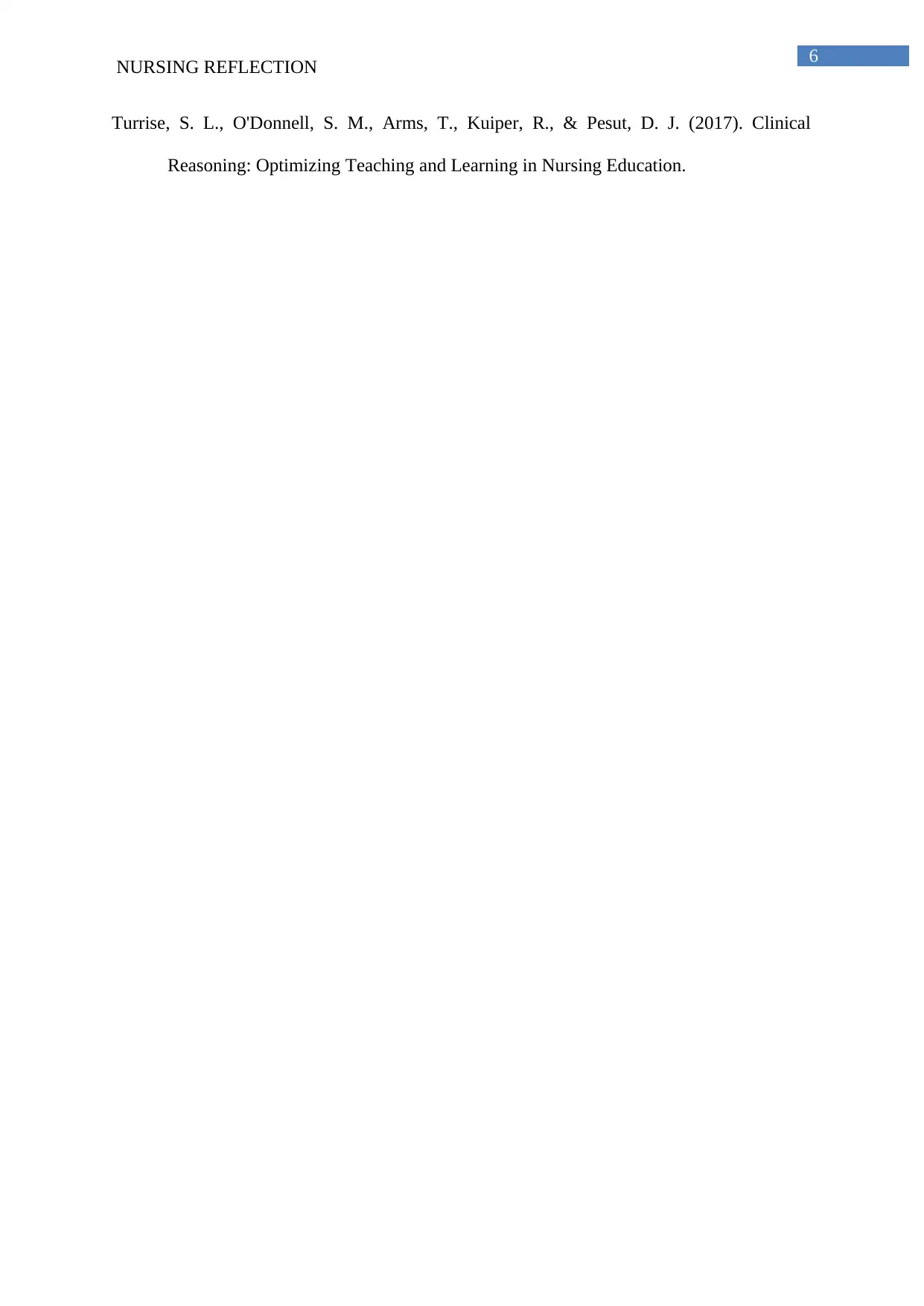
6
NURSING REFLECTION
Turrise, S. L., O'Donnell, S. M., Arms, T., Kuiper, R., & Pesut, D. J. (2017). Clinical
Reasoning: Optimizing Teaching and Learning in Nursing Education.
NURSING REFLECTION
Turrise, S. L., O'Donnell, S. M., Arms, T., Kuiper, R., & Pesut, D. J. (2017). Clinical
Reasoning: Optimizing Teaching and Learning in Nursing Education.
1 out of 7
Related Documents
Your All-in-One AI-Powered Toolkit for Academic Success.
+13062052269
info@desklib.com
Available 24*7 on WhatsApp / Email
![[object Object]](/_next/static/media/star-bottom.7253800d.svg)
Unlock your academic potential
Copyright © 2020–2026 A2Z Services. All Rights Reserved. Developed and managed by ZUCOL.





